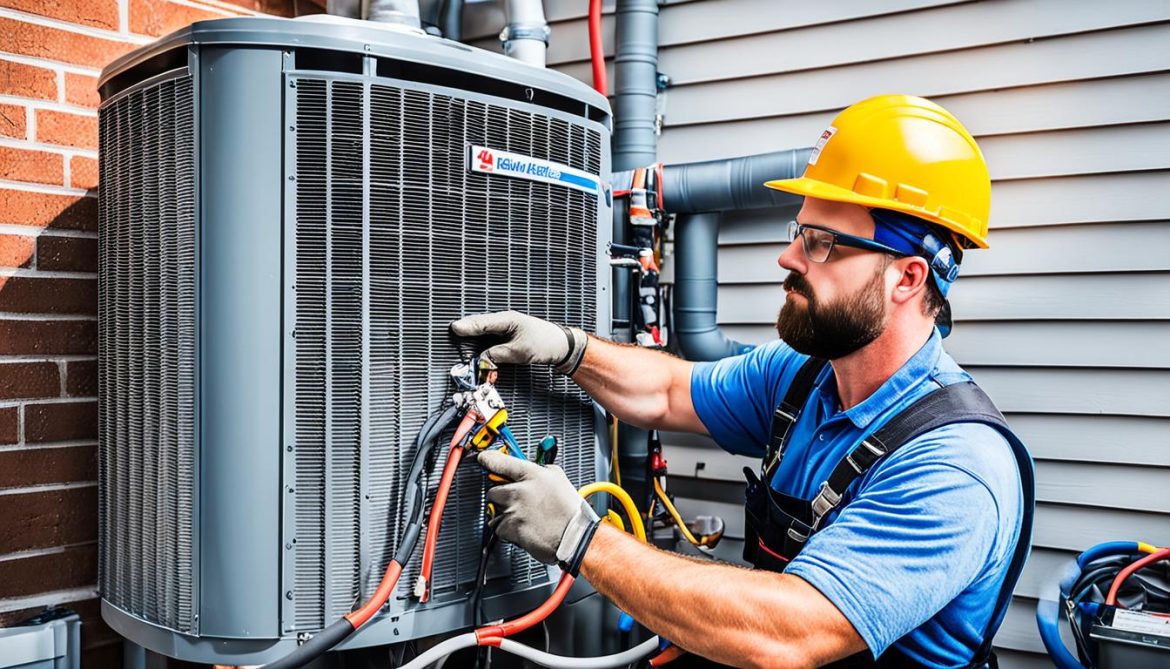Starting an HVAC business can be an exciting and lucrative venture. However, it requires careful planning and preparation to ensure success. This comprehensive guide will walk you through the essential steps and provide valuable tips to help you start your own HVAC business from scratch. Whether you’re an experienced HVAC technician looking to launch your company or a newcomer in the industry, this guide will equip you with the knowledge and strategies needed to navigate the challenges and build a successful HVAC business.
Key Takeaways:
- Creating a solid business plan is crucial for the success of your HVAC business. It helps define your vision, set goals, secure financing, and develop a marketing strategy.
- Consider the financial aspects of your HVAC business, including raising capital, pricing your services, purchasing equipment, obtaining insurance, and managing accounting and taxes.
- Familiarize yourself with government and industry regulations, local laws, employment laws, and health and safety regulations to fulfill your responsibilities as an HVAC business owner.
- Develop a comprehensive marketing strategy to promote your HVAC business, including building a strong brand, establishing an online presence, leveraging local advertising, and networking within the industry.
- Complete the necessary licensing and certifications, choose a suitable business structure, obtain permits, hire employees, and set up efficient business operations to officially launch your HVAC business.
Writing an HVAC Business Plan
Writing a comprehensive HVAC business plan is crucial for the success of your heating, ventilation, and air conditioning (HVAC) business. A well-crafted business plan serves as a roadmap for your company, guiding your decisions and strategies. It helps you define your vision, set practical goals, secure financing, develop marketing strategies, and mitigate potential problems.
When creating your HVAC business plan, begin by defining your vision for the company. What do you want to achieve with your business? What values and principles will guide your operations? Clearly articulating your vision will help you stay focused and aligned with your long-term goals.
Next, set practical goals that are specific, measurable, achievable, relevant, and time-bound (SMART). These goals will provide a clear direction for your business and serve as milestones to track your progress.
| Components of an HVAC Business Plan |
|---|
| 1. Executive Summary |
| 2. Company Description |
| 3. Market Analysis |
| 4. Competitive Analysis |
| 5. Marketing and Sales Strategy |
| 6. Organizational Structure |
| 7. Product or Service Offerings |
| 8. Financial Projections |
| 9. Funding and Financing |
| 10. Risk Assessment and Mitigation |
| 11. Appendix |
Financing is a crucial aspect of your HVAC business plan. Outline your financial projections, including revenue forecasts, expenses, and profitability analysis. This information will help you determine the amount of funding you need and support your efforts in securing financing.
Market analysis and competitive analysis are vital sections of your HVAC business plan. Conduct thorough research on your target market, including customer demographics, industry trends, and demand for HVAC services. Identify your competitors, analyze their strengths and weaknesses, and highlight how your business will differentiate itself.
Additionally, your HVAC business plan should include a comprehensive marketing and sales strategy. Outline your marketing initiatives, such as online advertising, social media campaigns, and local advertising. Discuss your pricing strategy and how you plan to promote your services to your target audience.
Lastly, the business plan should address potential problems and how you will mitigate them. Anticipate challenges that may arise, such as regulatory issues, supply chain disruptions, or labor shortages. Develop contingency plans to overcome these challenges and ensure the long-term success of your HVAC business.
By utilizing a business plan template and covering all the necessary aspects, you can create a robust HVAC business plan that will guide your company’s growth and success.
Finances for your HVAC business
Before starting your HVAC business, it’s essential to assess the financial aspects involved. Proper financial planning will help you make informed decisions and set your business up for success. Here are some key considerations:
Raising Capital
Starting an HVAC business requires capital to cover various expenses, such as purchasing equipment, securing inventory, and marketing your services. Determine the amount of capital you need and explore financing options, including:
- Small business loans from banks and financial institutions
- Government loan schemes specifically designed for small businesses
Pricing HVAC Services
Setting the right price for your HVAC services is crucial to maintain profitability. Consider the following factors when determining your pricing:
- Variable costs, such as labor, materials, and fuel
- Fixed costs, including rent, maintenance, insurance, and utilities
- Your skills, qualifications, and experience level
Purchasing Equipment
Investing in high-quality HVAC equipment is vital to delivering top-notch services. Research reputable suppliers and consider factors such as warranty, efficiency, and support services. Remember to factor in these costs when planning your budget.
Obtaining Insurance Coverage
Insurance is a crucial aspect of protecting your HVAC business from potential risks and liabilities. Obtain comprehensive insurance coverage that includes general liability insurance, worker’s compensation insurance, and property insurance.
Accounting and Taxes
Sound financial management is essential for the long-term success of your HVAC business. Ensure you have a reliable accounting system in place to keep track of your income and expenses, manage invoices, and stay on top of your tax obligations.
By carefully considering the financial aspects of your HVAC business, you can effectively manage your resources, increase profitability, and position your business for growth.
Your responsibilities as an HVAC business
As the owner of an HVAC business, you have a range of responsibilities beyond providing exceptional HVAC services. It’s crucial to understand and comply with various government and industry regulations to ensure the smooth and legal operation of your company. Additionally, you must be mindful of the environmental impact of your business operations, adhere to local laws, navigate employment laws if you plan to hire staff, and prioritize health and safety regulations.

Compliance with Government and Industry Regulations
Complying with government and industry regulations is imperative to maintain the integrity of your HVAC business. It includes adhering to environmental regulations, such as proper disposal of refrigerants and implementing energy-efficient practices. Familiarizing yourself with regional laws ensures that your business operates within legal boundaries, avoiding potential penalties or legal issues.
Environmental Impact
Your HVAC business also has an environmental impact. Implementing sustainable practices and promoting energy-efficient solutions can help reduce your carbon footprint and contribute to a greener future. This not only benefits the environment but can also attract environmentally conscious customers who appreciate your commitment to sustainability.
Local Laws and Employment Laws
Operating a business requires compliance with local laws, which vary by city, county, and state. It is essential to understand the specific regulations related to zoning, permits, licensing, and taxes in your area. If you plan to hire employees, you must also familiarize yourself with employment laws, including fair wage practices, employee benefits, and anti-discrimination measures.
Health and Safety Regulations
Prioritizing health and safety regulations is paramount to protect both your employees and customers. Ensure that your HVAC technicians receive proper training and adhere to safety protocols while performing their duties. Implementing regular safety inspections and maintaining a clean and hazard-free work environment helps prevent accidents and minimizes the risk of injuries.
Professional Trade Associations
Joining professional trade associations provides excellent support, training, and opportunities for professional development. These associations offer valuable resources, networking events, and educational programs that can help you stay updated on industry trends and best practices. Moreover, being associated with reputable trade associations enhances your credibility and can lead to increased customer trust and business opportunities.
| Summary of Your Responsibilities as an HVAC Business Owner | |
|---|---|
| Responsibilities | Key Points |
| Compliance with Government and Industry Regulations | – Adhere to environmental regulations – Stay updated on local laws |
| Environmental Impact | – Implement sustainable practices – Promote energy-efficient solutions |
| Local Laws and Employment Laws | – Comply with local business regulations – Understand employment laws |
| Health and Safety Regulations | – Prioritize employee and customer safety – Conduct regular safety inspections |
| Professional Trade Associations | – Join associations for support and training – Engage in networking and professional development opportunities |
Marketing your HVAC business
A solid marketing strategy is crucial for the success of your HVAC business. To attract clients and stand out from your competitors, you need to create a strong brand identity that reflects your business values.
Start by establishing an online presence through a professional website and active social media profiles. Your website should showcase your services, highlight customer testimonials, and provide easy contact options. Here’s an example of a strong online presence:
| Online Presence | Description |
|---|---|
| Professional Website | A well-designed and informative website is an essential tool for connecting with potential clients. Showcase your services, qualifications, and contact information. |
| Social Media Profiles | Active presence on popular social media platforms like Facebook, Instagram, and Twitter can help you engage with your audience, post updates, and share valuable content. |
In addition to your online presence, utilize local advertising methods to target your local market. Consider advertising in local newspapers, radio stations, or community boards. Here are some local advertising methods:
- Distribute flyers or brochures in your target neighborhood.
- Partner with other local businesses for mutual promotion.
- Attend local events or trade shows to connect with potential clients.
Customer referrals are also a valuable tool for marketing your HVAC business. Encourage satisfied customers to refer their friends, family, and colleagues. Consider offering referral bonuses or discounts as incentives.
Networking with other professionals in the industry can help you gain visibility and generate leads. Join local business networking groups, attend industry conferences, and engage with professionals on social media platforms. Here are some networking opportunities:
- Join local Chambers of Commerce or trade associations.
- Offer to speak at industry events or write guest articles for HVAC publications.
- Connect with HVAC supply companies and contractors for potential collaborations.
By implementing a comprehensive marketing strategy that includes creating a brand, establishing an online presence, utilizing local advertising, and networking with industry professionals, you can effectively promote your HVAC business and attract a steady stream of clients.
Launching your HVAC business
After completing all the necessary preparations, it’s time to officially launch your HVAC business. To ensure a smooth start and compliance with legal requirements, follow these steps:
Licensing and Certifications
Obtain all the required licensing and certifications necessary to operate your HVAC business legally. This may include state certifications, EPA certifications, and other industry-specific licenses. Compliance with these regulations demonstrates your professionalism and credibility in the industry.
Choosing a Business Structure
Choose a suitable business structure for your HVAC business, such as a sole proprietorship or Limited Liability Company (LLC). Consider consulting with an attorney or tax advisor to understand the legal and financial implications of each option. Register your business according to the chosen structure to establish its legal presence.
Obtaining Necessary Permits
Research and obtain any necessary permits or approvals from local authorities to operate your HVAC business. These permits may include building permits, zoning permits, or HVAC-specific permits. Compliance with local regulations ensures that you are operating within the boundaries of the law.
Hiring Employees
If you plan to hire employees for your HVAC business, familiarize yourself with employment laws and regulations. Ensure that you understand the hiring process, including tasks such as recruitment, interviewing, and onboarding. Establish appropriate HR processes, including an employee handbook, to maintain a positive and compliant work environment.
Setting up Business Operations
Set up your business operations to ensure a smooth workflow from day one. This includes securing office space, purchasing necessary equipment and tools, and implementing software systems to streamline operations. Establish efficient processes for scheduling appointments, managing invoices, and tracking expenses.
Image: HVAC Business Setup
By completing these steps, you are well on your way to successfully launching your HVAC business. Keep in mind that continuous learning and adaptation are essential in this industry. Stay updated on industry trends, provide exceptional service, and market your business effectively to ensure long-term success.
Conclusion
Starting an HVAC business requires careful planning and attention to detail. By following the steps outlined in this essential guide, you can set yourself up for success and overcome the challenges of starting a new HVAC company.
To launch a successful HVAC business, it is crucial to continuously learn and adapt to industry trends. Stay up to date with the latest technologies, regulations, and best practices in the heating and cooling sector. This knowledge will help you offer cutting-edge solutions to your customers and stay ahead of the competition.
Another key factor for success is effective marketing. Develop a strong brand identity, establish an online presence through a professional website and active social media profiles, and leverage local advertising and customer referrals to attract clients. Networking with other industry professionals can also open up opportunities for collaboration and referrals.
Providing exceptional service should be at the core of your HVAC business. Deliver high-quality workmanship, maintain open communication with your clients, and focus on exceeding their expectations. A reputation for excellent service will not only help you attract new customers but also foster repeat business and positive word-of-mouth referrals.
With determination, persistence, and the knowledge gained from this essential guide, you have the keys to successfully launch and grow your HVAC business. Embrace the challenges, stay focused on your goals, and always strive for excellence in all aspects of your operations. Good luck on your journey as an HVAC business owner!
FAQ
What is the importance of writing an HVAC business plan?
Writing a comprehensive business plan is crucial for the success of your HVAC business. It helps define your vision, set goals, secure financing, and develop a marketing strategy.
How should I finance my HVAC business?
Determine the capital required, explore financing options such as small business loans, and consider government loan schemes. Properly pricing your services is crucial for profitability. Purchase necessary equipment, obtain insurance coverage, and establish a sound accounting and tax system.
What responsibilities do I have as an HVAC business owner?
Comply with government and industry regulations, including environmental and health and safety standards. Familiarize yourself with local laws and employment laws if you plan to hire staff. Join professional trade associations for support and professional development.
How can I market my HVAC business effectively?
Start by creating a strong brand identity that reflects your business values and differentiates you from competitors. Establish an online presence through a professional website and active social media profiles. Utilize local advertising methods, leverage customer referrals, and network with industry professionals.
What do I need to do to launch my HVAC business?
Obtain the necessary licensing and certifications, choose a suitable business structure, and register your business. Obtain any required permits or approvals from local authorities. Familiarize yourself with employment laws if hiring employees and establish appropriate HR processes. Set up your business operations, including office space, equipment, and software systems.







